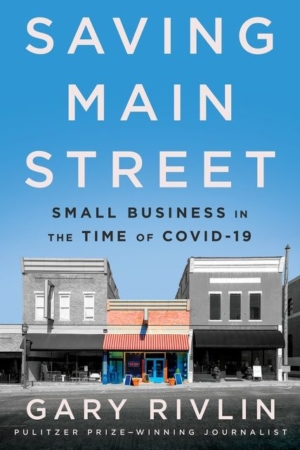Saving Main Street
Small Business in the Time of COVID-19
- Saving Main Street
- Praise
- Reviews
- Excerpts
- Media Appearances
-
In the spring of 2020, I began following a group of small business owners as they struggled to keep their businesses alive during Covid. That included TJ Cusumano, the chef-owner of Cusumano’s, just outside of Scranton, Pennsylvania; Vilma Hernandez, the immigrant owner of Vilma’s Beauty Salon in Hazleton, Penn.; Glenda Shoemaker, the owner of a “non-life sustaining” gift and card shop in the rural town of Tunkhannock, Penn.; and Dominic, Nicholas, and Daniel Maloney, three black siblings behind Sol Cacao, a high-end chocolate maker in the Bronx. Each were survivors that had stared down the big box stores, chains, the Internet, and whatever else the market had thrown their way. A pandemic would be just the latest challenge they would need to face to keep their doors open.
“A beautiful, memorable book,” said Joe Nocera, the long-time New York Times columnist of Saving Main Street. “His stories of small businesspeople trying to survive the pandemic will break your heart–and fill you with joy.”
From the publisher: “A veteran journalist follows an inspiring ensemble cast of small business leaders … while exploring the larger societal and governmental factors that have endangered the small business sector now more than ever.” Americans may extol the virtues of small, local, often family-run shops, yet increasingly make their purchases from a small universe of dominant corporate giants. Government-ordered shutdowns, contradictory governmental guidelines, and the mask wars only compounded the everyday challenges of running an independent business battling lower prices, convenience and endless choices.”
-
“A nuanced, first-rate look.”
Jennifer Senior, winner of the 2022 Pulitzer for Feature Writing and former New York Times columnist“A remarkable book. Rivlin recreates in real time the panic and heartbreak of small-business owners in the time of Covid…always with an unwavering novelist’s eye.”
Joshua Ferris, A Calling for Charlie Barnes“A beautiful, memorable book…His stories of small business people trying to survive the pandemic will break your heart–and fill you with joy.”
Joe Nocera, New York Times columnist“Everything you think you know about small business in America will be upended in this surprising and inspiring investigation of America’s Main Streets.”
Charles Duhigg, author of The Power of Habit“Full of insight and shrewd reporting.”
Publishers Weekly -
Publishers Weekly
Journalist Rivlin (Katrina) presents an illuminating account of how several small businesses weathered the Covid-19 pandemic. Rivlin introduces readers to TJ Cusumano, owner of an Italian restaurant in Old Forge, Pa.; Glenda Shoemaker, who runs a card and gift shop in Tunkhannock, Pa.; and the Maloney family, founders of a chocolate business in New York City, among others. They all faced tough decisions, such as having to lay off employees and find ways to pay mortgages and vendors, as well as dealing with the pain of potentially losing their life’s work. Rivlin shows his subjects’ struggles to keep afloat, as when Cusumano established a “pop-up market” to sell food supplies before they spoiled, and when the Maloneys slashed prices in an attempt to boost sales. Rivlin also highlights problems that small businesses have faced for decades, which made them especially vulnerable when the pandemic hit. In particular, he writes of how large corporations crush small businesses by offering low prices their competitors can’t, and how the Small Business Administration often enacts plans “rigged in favor of the large and dominant” (2020’s Paycheck Protection Program among them). This one’s full of insight and shrewd reporting.
Kirkus
In the best of times, running a small business is a precarious proposition; the pandemic made it nearly impossible. In early 2020, Rivlin, author of Broke, USA: From Pawnshops to Poverty, Inc.―How the Working Poor Became Big Business, among other books, set out to document how a handful of businesses dealt with the precipitous decline in customers, unrelenting mortgage and utility bills, and costs that escalated as supply chains faltered. Among others, these include Vilma’s Hair Salon, Cusumano’s Italian restaurant, Lech’s Pharmacy, J.R.’s Hallmark, and Sol Cacao, a chocolate bar business. During the pandemic, owners worried about their employees and rethought their businesses. They navigated shifting shutdown orders and mask mandates and applied for financial assistance from the federal and state governments. Making matters worse was the lack of a “coordinated federal plan”; each state made its own rules. In addition, there were the constant threats posed by large restaurant and pharmaceutical chains, retail behemoths such as Walmart, and, of course, Amazon. These large corporations not only undercut their prices; they also gutted the downtown centers that brought in customers. Politicians might celebrate small businesses for being essential to living in a community and for embodying the independent spirit that ostensibly defines the American character, but economic policy always favors big business. That many businesses survived was due, in part, to the loyalty of employees and customers, the support of local business associations, and governmental grants and loans that carried them through the worst of the pandemic. For Rivlin, though, most important were business owners’ “creativity and fortitude,” the tenacity and improvisational talent to get the job done.
-
an adaptation running in TIME
How One Small Business Found Sweet Success During the Pandemic
An excerpt at the HarperCollins site
-
A virtual talk I gave about my book, Saving Main Street, in 2022
Felt like a homecoming, great to talk Saving Main Street on KQED in San Francisco
‘Saving Main Street’ Chronicles Small Business Owners Fighting to Survive the Pandemic
Stand Up with Pete Dominick!
I talk with comedian/podcaster Pete Dominick (starts at around the 59:00 minute mark)




